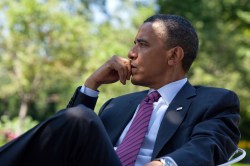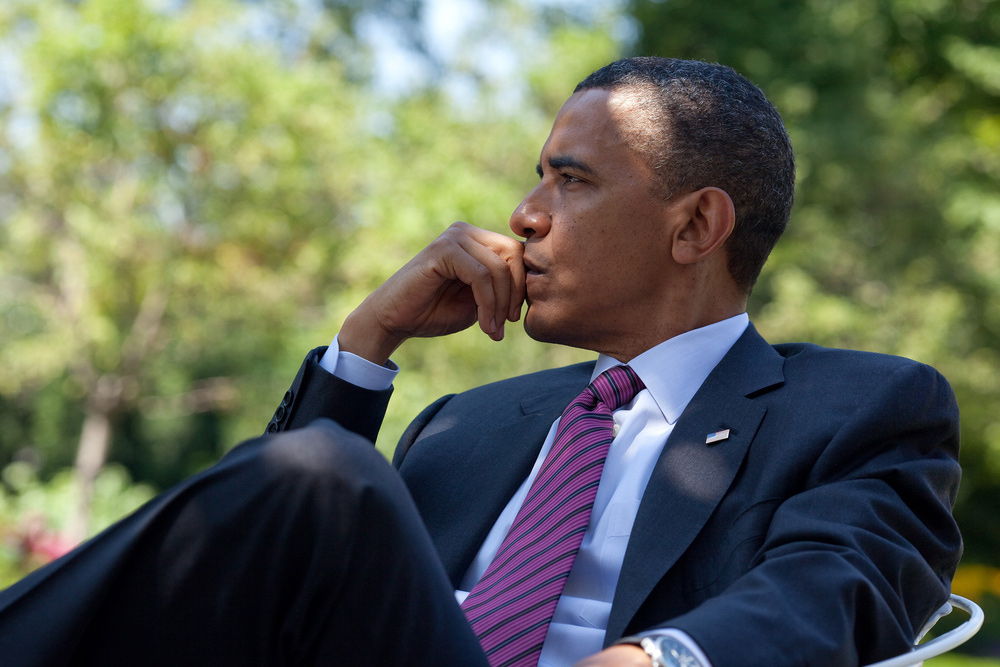
The White HouseHe’s thinking about climate. Now to get him acting …
The bloom is back on the rose. Since President Obama’s strong words on climate in his inaugural speech, Facebook and the blogosphere have been abuzz with climate hopefuls. The consensus is that Obama has always really wanted to act on climate and has simply been stymied by opposition forces. This time around, though, the gloves are off. The executive branch is back in action. Forward climate action!
Before we break out the champagne, though, I think our community needs to remember something: Barack Obama is a politician. He is facing a second term where climate will not be on Congress’ agenda. He knows that the environmental community worked itself into a frenzy over his perceived failure to lead during his first term. The words of a speech cost no more than the air. The inaugural address is an opportunity to pacify angry constituents by recognizing their concerns. Just as Obama included representatives of key communities in the inauguration ceremonies, he recognized another group of discontented supporters — i.e. climate activists — in his speech.
Let’s assume for the moment that the Obama administration does hope to act on climate. Here are the political realities: Every time the executive branch moves to exercise its authority — for example, to regulate some industry through the Department of Energy or the EPA — the Republicans will react with vigorous opposition. They will threaten Democratic leaders politically. They will hold press conferences. In the House of Representatives, GOP leaders will hold hearings, subpoena officials, and try to cut funding. Republicans will, in other words, make the administration’s life difficult. Facing these challenges, the executive branch will occasionally, and perhaps frequently, back down. This is politics.
The question then becomes: What can the environmental community do to encourage the Obama administration to follow through on its commitments?
To answer this question, we need to take a short step back. Over the last few weeks, many of the major climate analysts have resurfaced a dormant debate over the failure of climate legislation back in 2009-2010. The major question on the table is how to allocate the blame and in particular how much blame the White House deserves for not making climate a greater priority. This is difficult to resolve. As I note in a recent report on climate in the 111th Congress, actually measuring the influence of a president on a given issue is impossible. I happen to think that presidential leadership matters a great deal; after all, the last major overhaul of our energy system happened under President Carter. Carter was a terrible politician and yet still succeeded because energy reform was his top objective.
But whatever your opinion, most commentators agree on one thing: Climate has not been the Obama administration’s highest priority. Historical inquiry aside, the more relevant issue is not the effects of his inaction but their cause. We need to know why Obama failed to make climate the linchpin of his first term. The answer to that question will help us develop a strategy for making sure climate doesn’t get ignored this time around.
In my report, I suggest that the environmental movement had a strong inside-the-Beltway strategy for climate legislation. What they lacked was an equally strong outside-the-Beltway strategy and, in particular, the capacity to shift public opinion and exercise political power at the local and state level. Though the advice is in danger of becoming rote, it remains true. Over the next four years, the Obama administration will respond only under pressure. The executive branch is in a constant balancing act amidst competing forces, and we will need to make sure that it tips in the right direction.
In other words, the environmental community needs to make failing to act on climate as onerous for the administration as acting on climate. For every oversight hearing that the Republicans convene in Congress, we need a protest around the White House grounds. For every threat of funding cuts by the GOP, we need a storm of petitions. If we can do that — if we can push not only with lobbyists and policy reports but with demonstrations and public opinion polls — we can make Obama’s words into promises, and his promises into action.
Editor’s note: There’s been a flurry of discussion about U.S. climate politics in recent weeks, much of it inspired by a paper from Harvard academic Theda Skocpol [PDF] on the failure to enact climate legislation in 2009 and 2010. Read a summary of Skocpol’s paper by Philip Bump, a response from Bill McKibben, a response from Eric Pooley, a response from Joe Romm, and three (count ‘em: one, two, three) responses from David Roberts.



